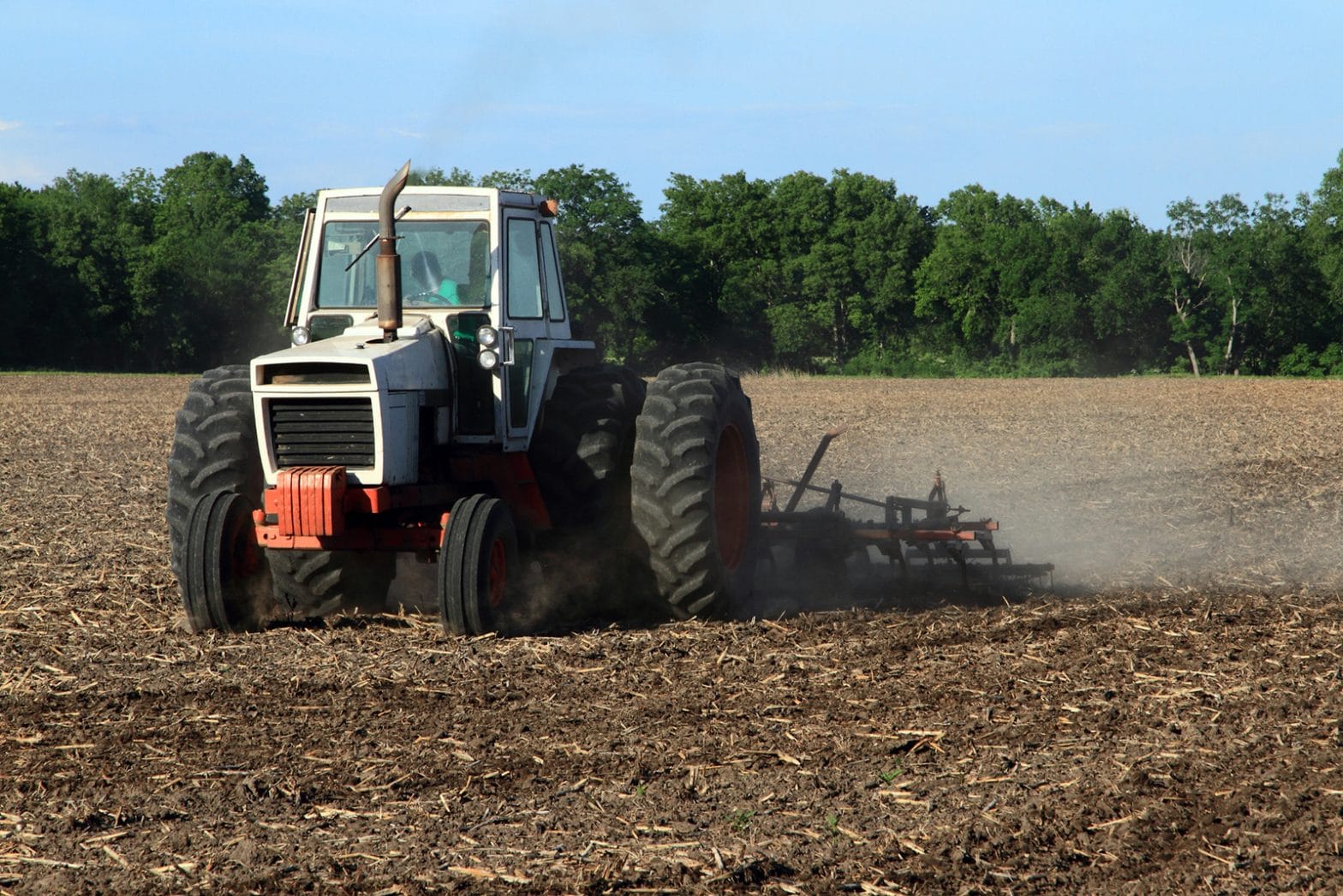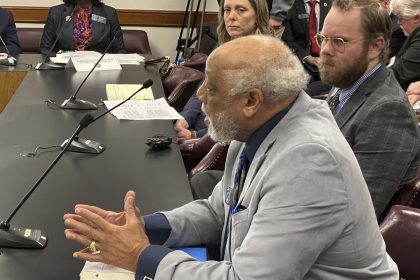Kansas Farmers Die by Suicide at an ‘Alarming’ Rate. The State Steps in to Help Them Cope

KANSAS CITY, Mo. — He fought it as long as he could. Mick Rausch didn’t know what was wrong until he finally hit a wall he could no longer climb on his own.
It was 10 years ago. His brother — younger by just a year and three days — had recently died. A late-spring frost damaged his wheat.
He was depressed. His wife knew it. He didn’t. He thought surely there was something wrong with her.
“And finally it escalated,” said the 65-year-old retired dairyman who lives in Sedgwick County west of Wichita.
One day he was out in the shed checking the drills used to sow the wheat when he lay down and fell asleep right under them, for three hours. He went back to the house and told his wife that she was right. “There’s something wrong. We need to get help,” he said.
He still gets the occasional funny look when he challenges a “taboo” among his fellow farmers and shares that he takes antidepressants. The tendency among farmers, he said, is “you just don’t like to talk about your difficulty. You put your head down and go to work and deal with it.”
The Kansas Department of Agriculture has decided that’s just not healthy anymore. This month the agency introduced a website to encourage stressed-out farmers and ranchers to talk.
“The increase in suicide rates among farmers and ranchers is alarming,” Kansas Gov. Laura Kelly said in a statement announcing the new website. “We must do everything in our power to curb this trend” and “provide our farmers and ranchers alternatives to suicide.”
KansasAgStress.org leads farmers to local and national sources of help, including the National Suicide Prevention Lifeline, 800-273-8255 (TALK).
“This is, quite honestly, long overdue. I’m sorry that it’s taken so long to put something like this together,” said Kelsey Olson, Kansas’ assistant agriculture secretary. “I feel like it’s just one small step in the direction of starting the conversation, getting people thinking and talking about it.”
Earlier this week, U.S. Sen. Charles Schumer, D-N.Y., visited a dairy farm in western New York to launch a nationwide battle against rising suicide rates among farmers.
He called on the Centers for Disease Control and Prevention to conduct a comprehensive study of suicides among farmers, a first of its kind. The CDC has run into recent problems trying to gather accurate data.
And he championed the Seeding Rural Resilience Act that includes a number of measures to help farmers manage their stress. Among them: a $3 million public awareness campaign about mental health issues on farms and ranches.
The new Kansas website offers support for all the members of a farm family, from “teens to aging adults,” with specific attention paid to veterans who are farming and bringing to the field their own unique set of mental health needs.
Stress is inherent in living off the land. Weather is Public Enemy No. 1. In recent years, though, market uncertainties, natural disasters and ongoing trade wars have created crushing mental stress, state agriculture officials say. The toll on the farm is just as ugly as in the cities and suburbs: anxiety, substance abuse, broken marriages, emotional distress.
Olson, who grew up on a farm in northwest Kansas and has a small ranch with her husband, is eager to banish the stigma that is loosening its grip but still clings to discussions about mental health in rural communities. She had heartfelt conversations at the state fair in Hutchinson this year and came away knowing which farmers lost friends to suicide.
They had been pallbearers.
HOPES AND DREAMS
Charlie Griffin has been talking to Kansas farmers about stress since the 1980 farm crisis. He grew up on a farm in central Kansas and spent much of his career counseling farm families across the state.
“When the farm crisis hit in the early ‘80s I somehow managed to talk to farmers about stress and not get laughed out of the room,” said Griffin, now a Kansas State University professor emeritus who lives in Manhattan. “It was not an easy conversation farmers tended to have.”
The late ‘70s and ‘80s conjured “the perfect storm” of bad weather, high fuel costs and a grain embargo that “dropped the prices kind of overnight.”
“What makes it stressful now was the same in the 1980s — the lack of ability of an individual farmer to control many of the aspects that are affecting them,” said Griffin.
“What can one farmer do to control international markets, to control commodity prices? Very little. They can be sharp as they can with marketing and find some edge, but there’s only so far you can go to make that up.”
New worries for farmers were created by floods that followed droughts, creating crippling financial whiplash.
“So once again, what do you do to control that? You can’t stop heavy rains. You can’t stop flooding. You just have to go through it and turn around and try to recover the next year,” he said.
Losing a farm that’s been in a family for multiple generations is a particularly brutal emotional blow. No one wants to be the one in charge when the family farm goes under.
For many, this “has been the only thing they’ve ever done in their lives, and it’s covered generations — two, three generations of a family farming together with the hopes and dream that they’ll pass it on to their kids and right now they’re looking at not being about to do that, many of them,” said Griffin. “So that in a nutshell is the kind of situation that’s affecting many people.”
It’s not as though farmers can easily walk away when things go south.
“Small businesses for everybody have a reasonably low success rate. A lot of them go out of business. People turn around and try another business. Or get a job for somebody else,” said Griffin. “But farming is so grounded to a lifestyle, a culture, a community, a family history and a very, very close relationship to the land that you don’t just turn around” and leave.
“There are hopes and dreams that are tied in pretty deeply there. So when you are doing the best you can, and it’s not working, yes … hopelessness. It can be pretty hard.”
Griffin said that though farmers have been “remarkably hesitant to ask for help,” he senses a tide turning with more families willing to seek help from a therapist. That, however, is not easy in rural communities where hospitals are closing and the “local” community mental health center can be more than 100 miles away.
And if a farm family can manage to get to a therapist, there’s no guarantee that therapist will be plugged into the farming lifestyle and know what questions to ask. “Typically when they need help with depression or anxiety, they don’t go to a therapist first, they probably go talk to their physician, minister, maybe a family friend,” Griffin said.
He called it “absolutely necessary” that the ag department keep its new website up and running. He recalled a female rancher in western Kansas who attended one of his stress workshops in the ‘80s. She kept a brochure for his services right by her phone.
She called him for help — three years later.
‘THERE’S A LOT OF POSITIVE’
The family photos that 36-year-old Danielle Stenger posts on social media portray life on Eagle Ridge Ranch as Instagram beautiful. Her cherub-faced 7-year-old son, Colten, cuddles a chicken. Delaney, who is 4, grins as she goes nose-to-nose with the sheep.
Those are the blessings of farm life Stenger and her husband, Jacob, 35, came looking for when they left jobs as firefighter paramedics back East and moved onto land near Milford Lake outside Junction City four years ago.
With another baby due next week, the Stengers are attractive ag ambassadors, happy to share their story on Facebook and the website of the Kansas Farm Food Connection, which promotes various agriculture groups.
But even though Stenger protests that their level of stress is nothing compared to what bigger operations face, they must manage it, too.
They had to find the start-up costs for their farm, where they practice “poly-culture” — using the chicken manure to fertilize the pasture, letting the hogs root around the forest clearing unwanted saplings, and so on.
Then came the Kansas heat. Would there be enough grass left for pasture?
Then came flooding that sent Stenger chasing after baby chicks floating away.
They worry about lambs born during cold wet spells. Will they get pneumonia? What about the sheep busting through the fences?
Will the electricity hold out? Will the money hold out?
Their work arrangement mimics that of many rural families. Jacob works on the farm and Danielle works in town. She is a nurse anesthetist in Abilene, and a lot of co-workers are farmers’ wives, too. At the hospital she gives pain shots to farmers she knows are suffering from depression caused by chronic pain.
She describes their life as a balancing act.
She likes the idea of the ag department’s new website, calling it a “step in the right direction. Anything we can do to maybe help somebody we couldn’t reach,” she said. “The stress is daily, and it’s just not acknowledged. At least this will make it a little bit more normalized to get help.”
Rausch has similar hopes for the website.
“It’s kind of a taboo subject among farmers. We’re independent,” said Rausch. “We don’t like airing our dirty laundry to somebody, just kind of keep it in the family. But the way things are now, you can’t do it anymore, simply because it affects too many people. It affects my family, it affects people I deal with on a day-to-day basis.
“You’ve got to learn to ask for help. It’s not a sign of weakness. I guess that’s maybe what some people think about it.”
Olson said the new website will change as new ideas roll in. One that she likes: holding mental health first aid classes. Ag officials want farm families to be on the lookout for distress signals, including insomnia, headaches and physical fatigue.
Is your family member withdrawing from social activities? Becoming more grouchy, more angry?
“The worst thing is they think they can take their life and if they can pull it off, insurance will take care of their family,” said Griffin, who has heard hopeless words like that before. “There is nothing financial that can replace human life.”
———
©2020 The Kansas City Star (Kansas City, Mo.)
Visit The Kansas City Star (Kansas City, Mo.) at www.kansascity.com
Distributed by Tribune Content Agency, LLC.























